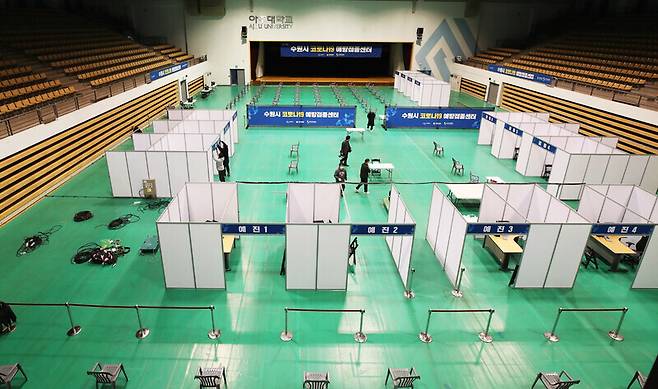Herd immunity to be achieved when 70% of population is vaccinated
전체 맥락을 이해하기 위해서는 본문 보기를 권장합니다.
In the daily briefing on Feb. 22, Korea Disease Control and Prevention Agency (KDCA) Commissioner Jung Eun-kyeong said, "If we assume an antibody formation rate of 80% following vaccination, then vaccination of 70% [of the population] would give a positive antibody rate of 56%."
But Jung also noted, "The efficacy numbers for the vaccine could change with the numerous virus variants that have been emerging recently, and clinical testing [by the pharmaceutical companies responsible for developing vaccines] is currently being expanded to see whether the vaccine should be administered to those under the age of 18."
이 글자크기로 변경됩니다.
(예시) 가장 빠른 뉴스가 있고 다양한 정보, 쌍방향 소통이 숨쉬는 다음뉴스를 만나보세요. 다음뉴스는 국내외 주요이슈와 실시간 속보, 문화생활 및 다양한 분야의 뉴스를 입체적으로 전달하고 있습니다.

Administering COVID-19 vaccines to over 70% of South Korea’s population will allow herd immunity to be achieved even when the virus’s reproduction number (R0, indicating the expected number of additional infections associated with any one patient) is around 2, the South Korean government said.
At the same time, it said the herd immunity target could be adjusted based on factors including the vaccine administration rate, vaccine supplies and infections with virus variants.
The government plans to begin administering a vaccine developed by AstraZeneca to residents and staff at long-term care hospitals and senior care facilities at 9 am on Feb. 26. Administration of the same vaccine to healthcare workers at middle-sized and large hospitals is to begin on Mar. 8.
In the daily briefing on Feb. 22, Korea Disease Control and Prevention Agency (KDCA) Commissioner Jung Eun-kyeong said, “If we assume an antibody formation rate of 80% following vaccination, then vaccination of 70% [of the population] would give a positive antibody rate of 56%.”
“Assuming a reproduction number of 2, we can come up with a simple estimate of around 50% being the standard for herd immunity,” she added. Her explanation came in response to pessimistic predictions that South Korea is unlikely to achieve herd immunity by November of this year by vaccinating 70% of the total population.
But Jung also noted, “The efficacy numbers for the vaccine could change with the numerous virus variants that have been emerging recently, and clinical testing [by the pharmaceutical companies responsible for developing vaccines] is currently being expanded to see whether the vaccine should be administered to those under the age of 18.”
“In light of these factors, there will need to be ongoing reviews and adjustments to our vaccination rate and herd immunity targets,” she said.
South Korea’s COVID-19 vaccinations are scheduled to begin at 9 am on Feb. 26. Around 289,000 residents and employees under the age of 65 at long-term care hospitals, senior care facilities, psychiatric hospitals and rehab facilities are set to receive the AstraZeneca vaccine.
On Feb. 27, administration of the Pfizer vaccine is to begin for healthcare workers treating COVID-19 patients. On Mar. 8, administration of the AstraZeneca vaccine is to begin for healthcare workers at medium-sized and large hospitals, which are frequently used by patients with severe symptoms.
By Suh Hye-mi, staff reporter
Please direct comments or questions to [english@hani.co.kr]
Copyright © 한겨레. All rights reserved. 무단 전재, 재배포 및 크롤링 금지.
- 임금 제때 못받는 ‘코로나 파견’ 의료인…중수본 ‘법 위반’ 논란
- 김경협 “MB·박근혜 국정원, 불법사찰 문건 20만건”
- 상표띠 없는 생수, 이르면 상반기 출시…삼다수·아이시스 등
- 추신수 연봉 27억원 중 10억원 기부…박찬호 복귀 때도 전액 기부
- 백신접종 뒤 입원 위험, 아스트라가 화이자보다 낮았다
- ‘잠수복 월남’, 군은 ‘해안철책 배수로’ 있는 줄도 몰랐다
- [뉴스AS] 성분 조작 ‘무죄’·허가 취소 ‘적법’…인보사 엇갈린 판결, 왜?
- 텍사스 정전, 재생에너지 탓 아닌 ‘전력 시장 자유화’ 참사였다
- 김경협 “MB·박근혜 국정원, 불법사찰 문건 20만건”
- “미친 사람만 그릴 수 있는”…뭉크가 ‘절규’에 남긴 미스터리 풀렸다